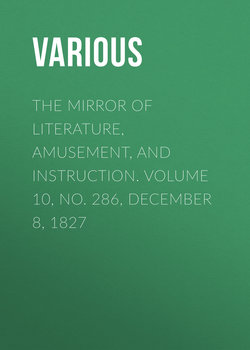Читать книгу The Mirror of Literature, Amusement, and Instruction. Volume 10, No. 286, December 8, 1827 - Various - Страница 7
TEA.—ITS INTRODUCTION INTO ENGLAND
BOOKS AND BOOKWORMS
Оглавление(For the Mirror.)
Books were anciently made of plates of copper and lead, the bark of trees, bricks, Stones, and wood. Josephus speaks of two columns, the one of stone, the other of brick, on which the children of Seth wrote their inventions and astronomical discoveries. Porphyry mentions some pillars, preserved in Crete, on which the ceremonies observed by the Corybantes in their sacrifices were recorded. The leaves of the palm-tree were used, and the finest and thinnest part of the bark of such trees as the lime, the ash, the maple, and the elm; from hence comes the word liber, which signifies the inner bark of the trees; and as these barks are rolled up, in order to be removed with greater ease, these rolls were called volumen, a volume, a name afterwards given to the like rolls of paper or parchment. By degrees wax, then leather, were introduced, especially the skins of goats and sheep, of which at length parchment was prepared; also linen, then silk, horn, and lastly paper. The rolls or volumes of the ancients were composed of several sheets, fastened to each other, rolled upon a stick, and were sometimes fifty feet in length, and about a yard and a half wide. At first the letters were only divided into lines, then into separate words, which, by degrees, were noted with accents, and distributed by points, and stops into periods, paragraphs, chapters, and other divisions. In some countries, as among the orientals, the lines began from the right, and ran to the left; in others, as in northern and western nations, from the left to the right; others, as the Grecians, followed both directions alternately, going in the one and returning in the other.
In the Chinese books, the lines run from top to bottom. Again, the page in some is entire and uniform; in others, divided into columns; in others, distinguished into text and notes, either marginal or at the bottom; usually it is furnished with signatures and catch-words, also with a register to discover whether the book be complete. The Mahometans place the name of God at the beginning of all their books. The word book is derived from the Saxon boc, which comes from the northern buech, of buechans, a beech, or service-tree, on the bark of which our ancestors used to write. A very large estate was given for one on Cosmography by king Alfred. About the year 1400, they were sold from 10l. to 30l. a piece. The first printed one was the Vulgate edition of the Bible, 1462; the second was Cicero de Officiis, 1466. Leo I. ordered 200,000 to be burnt at Constantinople. In the suppressed monasteries of France, in 1790, there were found 4,104,412 volumes; nearly one-half were on theology. The end of the book, now denoted by finis, was anciently marked with a <, called coronis, and the whole frequently washed with an oil drawn from cedar, or citron chips strewed between the leaves, to preserve it from rotting.
Thus far books; now for the bookworms. Anthony Magliabecchi, the notorious bookworm, was born at Florence in 1633; his passion for reading induced him to employ every moment of his time in improving his mind. By means of an astonishing memory and incessant application, he became more conversant with literary history than any man of his time, and was appointed librarian to the grand duke of Tuscany. He has been called a living library. He was a man of a most forbidding and savage aspect, and exceedingly negligent of his person. He refused to be waited upon, and rarely took off his clothes to go to bed. His dinner was commonly three hard eggs, with a draught of water. He had a small window in his door, through which he could see all those who approached him; and if he did not wish for their company, he would not admit them. He spent some hours in each day at the palace library; but is said never in his life to have gone farther from Florence than to Pratz, whither he once accompanied Cardinal Norris to see a manuscript. He died at the age of 81, in the year 1714. In the present age we have bookworms, who wander from one bookstall to another, and there devour their daily store of knowledge. Others will linger at the tempting window filled with the "twopenny," and read all the open pages; then pass on to another of the same description, and thus enjoy literature by the way of Cheapside.
P.T.W.
